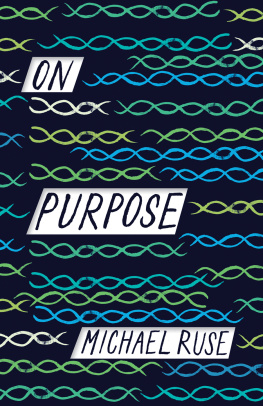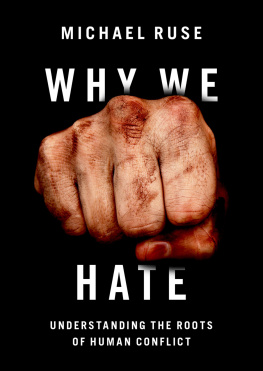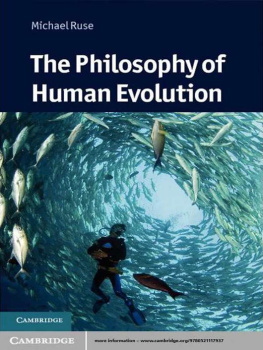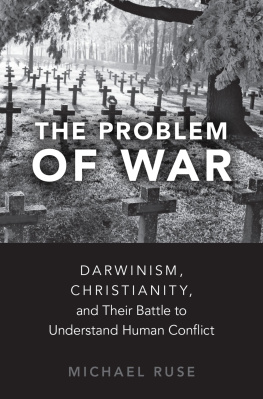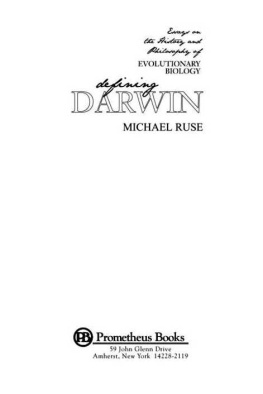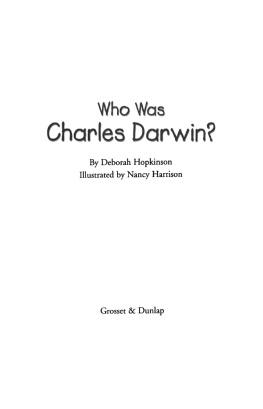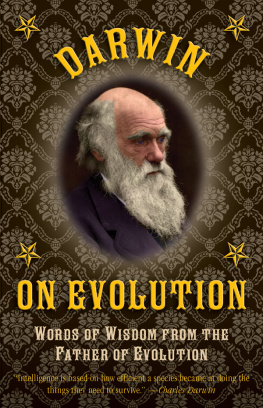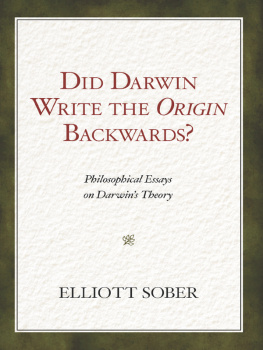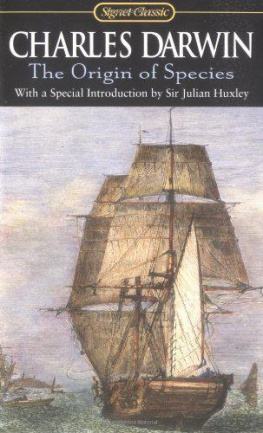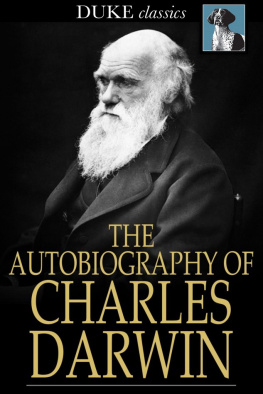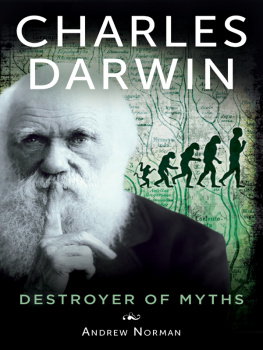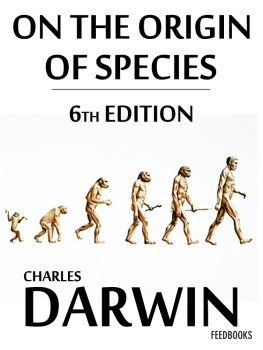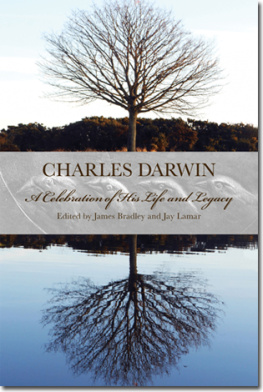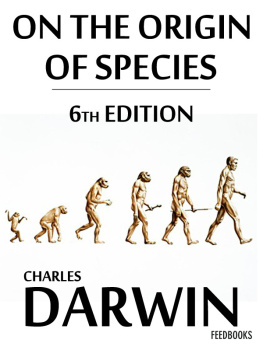Simply Darwin
Michael Ruse
Simply Charly
New York
Copyright 2016 by Michael Ruse
Cover Illustration by Jos Ramos
Cover Design by Scarlett Rugers
All rights reserved. No part of this publication may be reproduced, distributed, or transmitted in any form or by any means, including photocopying, recording, or other electronic or mechanical methods, without the prior written permission of the publisher, except in the case of brief quotations embodied in critical reviews and certain other noncommercial uses permitted by copyright law. For permission requests, write to the publisher, addressed Attention: Permissions Coordinator, at the address below.
Simply Charly
5 Columbus Circle, 8th Fl
New York, NY 10019
www.simplycharly.com
ISBN: 978-1-943657-01-8
Contents
Simply Darwin -- Simply Darwin
1
Praise for Simply Darwin
Written in a direct, funny and compelling style, Simply Darwin is simply Michael Ruse at his best, distilling a complicated history or idea to its essential features so that it is readily comprehended. The reader will be impressed with his synthesizing ability and his talent to develop conceptions that seem irresistibleeven if, on due reflection, you want to resist.
Robert J. Richards, Fishbein Professor of the History of Science, University of Chicago
In his inimitable style, Michael Ruseone of the worlds foremost experts on the history of evolutionprovides an entertaining, stimulating, and provocative account of the life and legacy of Charles Darwin. This is one of the best short summaries of the topic available. Highly recommended especially for students and general readers.
David Sepkoski, Research Scholar, Max Planck Institute for the History of Science
An excellent sprint through the highlights of Darwins life and work. Ruse is a masterful writer who presents a clear account of who Darwin was and why he was important. Its the connection to larger questions of our lives that makes this book a success. Well done, Ruse!
Joe Cain, Professor of History and Philosophy of Biology, University College London
Anyone interested in Darwin, the man and his ideas, will find this an engaging read. No other book provides such a rich account of Darwin and his transforming theory in a colloquial manner, and yet is faithful to the historical details and the philosophical depth of his contribution to science.
Paul Thompson, Professor in the Institute for the History and Philosophy of Science and Technology, University of Toronto
Titles -- Simply Darwin
2
Other Great Lives Titles
Simply Austen by Joan Klingel Ray
Simply Beckett by Katherine Weiss
Simply Beethoven by Leon Plantinga
Simply Chaplin by David Sterritt
Simply Chopin by William Smialek
Simply Descartes by Kurt Smith
Simply Dickens by Paul Schlicke
Simply Dirac by Helge Kragh
Simply Dostoevsky by Gary Saul Morson
Simply Edison by Paul Israel
Simply Eliot by Joseph Maddrey
Simply Euler by Robert E. Bradley
Simply Faulkner by Philip Weinstein
Simply Freud by Stephen Frosh
Simply Gdel by Richard Tieszen
Simply Hegel by Robert Wicks
Simply Heidegger by Mahon OBrien
Simply Hemingway by Mark P. Ott
Simply Hitchcock by David Sterritt
Simply Joyce by Margot Norris
Simply Machiavelli by Robert Fredona
Simply Napoleon by J. David Markham & Matthew Zarzeczny
Simply Newton by Michael Nauenberg
Simply Riemann by Jeremy Gray
Simply Tolstoy by Donna Tussing Orwin
Simply Twain by R. Kent Rasmussen
Simply Wagner by Thomas S. Grey
Simply Wittgenstein by James C. Klagge
Simply Woolf by Mary Ann Caws
3
Series Editor's Foreword
Simply Charlys Great Lives series offers brief but authoritative introductions to the worlds most influential peoplescientists, artists, writers, economists, and other historical figures whose contributions have had a meaningful and enduring impact on our society. Each book, presented in an engaging and accessible fashion, provides an illuminating look at their works, ideas, personal lives, and the legacies they left behind. Our authors are prominent scholars and other top experts who have dedicated their careers to exploring each facet of their subjects work and personal lives.
Unlike many other works that are merely descriptions of the major milestones in a persons life, the Great Lives series goes above and beyond the standard format and content. Every book includes not just the biographical information, such as the little-known character traits, quirks, strengths and frailties, but, above all, focuses on each individuals extraordinary professional achievements.
In its exploration of famous lives that have sometimes been shrouded in secrecy, surrounded by myths and misconceptions, or caught up in controversies, the Great Lives series brings substance, depth, and clarity to the sometimes-complex lives and work of historys most powerful and influential people.
What can a reader learn from the Great Lives series? These volumes shed light on the thought processes, as well as specific events and experiences, that led these remarkable people to their groundbreaking discoveries or other achievements; the books also present various challenges they had to face and overcome to make history in their respective fields.
We hope that by exploring this series, readers will not only gain new knowledge and understanding of what drove these geniuses, but also find inspiration for their own lives. Isnt this what a great book is supposed to do?
Charles Carlini, Simply Charly
New York City
This is a book on Charles Darwin. One is tempted to say, this is yet another book on Charles Darwin. If you have any doubts, go to Amazon.com and type in Charles Darwin. You get 21,549 results. To put things in perspective, if you type in Michael Ruse you get 623 results, and I bet most of those are a function of the fact I share my name with the English word for a trick, a ruse.
So why yet another book on Charles Darwin? Partly because it is a good tale to tella rich young man, of apparently rather modest talents, who travels to faraway lands, upon coming back to England, finds one of the most significant theories in the whole of science. And partly because, even today, there is new material coming out, which changes or modifies our views. The latest finding, for instance, is that Darwin may have been lactose intolerant. This has implications for the way we understand him and his theory. Did he spend his life cowering in a rural village avoiding company, racked with psychosomatic pain from the stress of having discovered a theory that was to get so hostile a reaction from his society? Or were Darwins ailments a matter of simple physiology and coming to and holding his theory was no great strain at all? And does this tell us something about both Darwin and the society in which he lived, namely that however major the coming of evolution might have been, it was not something that would universally be considered threatening or even unwelcome?
The tale is worth retelling because history is never just one fact after another. One writes it and shapes it, according to our interests. The truth is that today, especially in America, Darwins ideas are highly controversial, primarily because they are taken to oppose the widespread commitment to a form of evangelical Christianity. I will probably not make many converts, especially among older people, but if some young people read this book and decide that it is a more interesting and challenging world than they have so far been led to think, that in itself is a good reason for the book.


